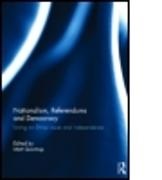Read more
Democracy is above all about majority rule. But which majority should rule if a part of a country wants to secede and become independent? Should the majority of the whole country decide? Or only the majority in the part that seeks to become independent be allowed to vote? Referendums and democracy have often been perceived to be almost incompatible with nationalism and ethnicity. Are they? Are there limits to democracy and the use of referendums? This book looks at these issues through a comprehensive study of the referendums held on ethnic and nationalist issues since the French Revolution. It analyses the pros and cons of referendums and presents a nuanced and up-to date tour d'horizon of the academic and scholarly writings on the subject by experts in international law, comparative politics and international law. This book was published as a special issue of Nationalism and Ethnic Politics.
List of contents
1. Introduction: Referendums, Democracy, and Nationalism 2. Secessionist Referenda in International and Domestic Law 3.Independence Referendums and Democratic Theory in Quebec and Montenegro 4. Context and Postconflict Referendums 5. Phantom Referendums in Phantom States: Meaningless Farce or a Bridge to Reality? 6.If At First You Don’t Succeed, Try, Try Again: (Re)Designing Referenda to Ratify a Peace Treaty in Cyprus 7.Language and Sovereignty Referendums: The Convergence Effect 8.The History of Ethno-National Referendums 1791–2011
About the author
A lawyer and a political scientist, Matt Qvortrup earned his doctorate at the University of Oxford. Described by the BBC as ‘one of the world’s leading experts on referendums’, he has advised the US State Department on referendums and elections and is the winner of the Oxford University Law Prize 2012.
Summary
Democracy is above all about majority rule. But which majority should rule if a part of a country wants to secede and become independent? Should the majority of the whole country decide? Or only the majority in the part that seeks to become independent be allowed to vote? Referendums and democracy have often been perceived to be almost incompatible with nationalism and ethnicity. Are they? Are there limits to democracy and the use of referendums? This book looks at these issues through a comprehensive study of the referendums held on ethnic and nationalist issues since the French Revolution. It analyses the pros and cons of referendums and presents a nuanced and up-to date tour d’horizon of the academic and scholarly writings on the subject by experts in international law, comparative politics and international law.
This book was published as a special issue of Nationalism and Ethnic Politics.

